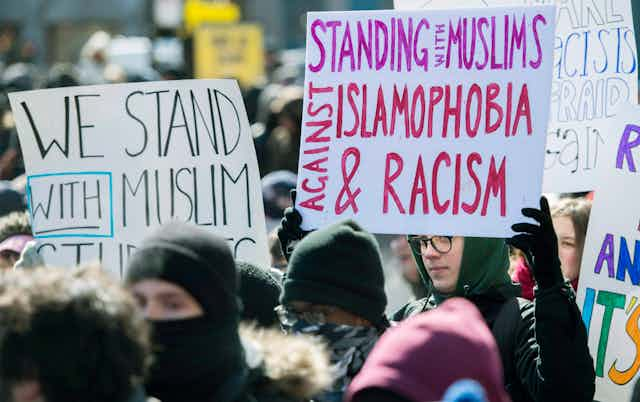“The clash of civilizations,” wrote the late American political scientist Samuel Huntington in a famous 1993 article, “will dominate global politics.” He predicted: “The fault lines between civilizations will be the battle lines of the future.”
Picked apart by critics for conceptual and empirical errors, the tragedy of 9/11 breathed new life into his theory of international relations. Huntington was regarded as prophetic.

His vision of an “Islam with bloody borders” that would confront the West, fuelled by Muslim extremists, put wind in the sails of the so-called War on Terror, turning western Muslims into suspects, not citizens, and transforming them into societal outcasts.
But Huntington also predicted:
“If civilization is what counts … the likelihood of violence between Ukrainians and Russians should be low. They are two Slavic, primarily Orthodox peoples who have had close relationships with each other for centuries.”
Now that the Russian invasion of Ukraine has proved him spectacularly wrong, it’s time to throw out his whole outlook, which has traumatized Muslims the world over.
Read more: Russia's actions in post-Soviet wars provide clues to its brutal Ukraine invasion
What was Huntington’s theory about?
Some might argue that a theory is made of parts, and Huntington may have been wrong on the Russian element of his beliefs, but on Islam, he was right — so there’s no need to throw the baby out with the bath water.
However, the Clash of Civilizations theory has devastated Muslims for years because it formed the basis of post-9/11 security policies that targeted the supposed enemy of the West — Muslims. We need to shatter the Huntington lens completely, not just remove the portion on Russia and Ukraine.
First, a brief recap of the theory.
Many analysts are reluctant to predict what politics will look like in the future. Huntington didn’t hesitate, and was happy to provide editors at the magazine Foreign Affairs, Jim Hoge and Fareed Zakaria, the “big and controversial” article they wanted for their launch.

His piece, “The Clash of Civilizations?” — the question mark was removed for the book version — argued that wars had evolved from fights between princes to conflicts among nations and then to ideological clashes.
Huntington opined that the future conflicts that would dominate the globe would be wars between civilizations. The most likely culprit would be Islam which, he said, had “bloody borders.”
Sept. 11 elevated the theory
Without 9/11, Huntington’s theory would have likely been relegated to academia.
Even on the “Islam versus the West” count, it failed. It did not account for:
• A stable alliance between the United States and Saudi Arabia
• Sectarian or ethnic divisions within civilizations (Protestant/Catholic; Sunni/Shia; Germany/France; Turks/Arabs/Persians/Malays, etc.)
• Inter-ethnic and inter-religious pluralism in Muslim history (700 odd years of the Convivencia in Al Andalus, Muslim Spain)
• Alliances between Islamists and the CIA in the 1979 Afghan war to oust the Soviet Union
• Millions of Muslims eager and happy to live in western countries.
That’s a brief list.
Muslim leaders pushed for alternative world views, such as former Iranian president Seyed Mohammad Khatami in his Dialogue of Civilizations and via organizations like the Alliance of Civilizations and the Common Word Initiative that evolved into World Interfaith Harmony Week. They countered that politics was never inevitable, but shaped by choices we make.
Sherene Razack, a Canadian women’s studies and critical race academic, argues that niqab bans are illogical because none of the stated reasons, such as inability to communicate or integrate, stand up to comparative scrutiny, so we must turn to psychoanalysis to understand.
Read more: Québec's push to ban the hijab is 'sexularism'
The same applies to Huntington’s theory. Why does the theory still appeal, despite evidence that it’s wrong?
The Clash of Civilizations still has traction because of its emotive, tribal appeal, setting up an us-versus-them scenario that’s helped create anti-Muslim westerners and anti-westerner Muslims.
Harm to Muslim westerners
Muslim youth growing up in the West since 9/11 have experienced a “collective trauma,” as one of my students put it recently.
Their weekly reflection notes written in response to class discussions roil with themes of despair at being scapegoated for violent actions that happened before they were born and that they had nothing to do with.
They’re resentful that their beloved faith has been singled out for being violent, while they know and experience western violence in the name of democracy. They watched as the U.S. dropped more than 26,000 bombs on Iraq, Syria, Afghanistan, Libya, Yemen, Somalia and Pakistan in 2016 alone.
Some feel anxiety and depression at not being able to fit in and be accepted for who they are.

The scant literature on the psychological fallout from being treated as a terror suspect highlights mental health issues of despair, anxiety, depression — a chronic trauma embracing the entire Muslim community, young to old.
The West and Islam share many values that can form the foundation of good relations. There’s no need to outcast those who share ideals of standing up for justice, service to the poor, aiding neighbours, being kind to the elderly and children and the importance of hard work and self-sufficiency.
Next year, the Clash of Civilizations theory will have done a terrible job at explaining geopolitical forces for the past 30 years. Let’s throw it a retirement party.

